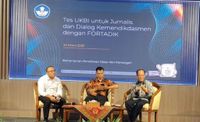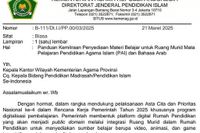INDOPOSCO.ID – On March 24, 2025, Hafidz Muksin, the Head of the Language Development and Fostering Agency (Badan Bahasa) within the Ministry of Basic and Secondary Education (Kemendikdasmen), announced a significant uptick in the number of participants taking the Indonesian language proficiency test, known as UKBI. Over 1 million individuals have already engaged with this essential assessment.
"Ini (UKBI) untuk menjaga kedaulatan bahasa Indonesia di satuan pendidikan," Muksin stated, emphasizing that the proficiency test helps maintain the sovereignty of the Indonesian language within educational institutions.
Jawa Timur has emerged as the province with the highest number of UKBI users, while the cities of Sidoarjo and Jakarta Selatan are leading in participation rates. This growing engagement suggests a robust commitment to enhancing language proficiency across the nation.
Muksin further elaborated on the practical aspects of the UKBI, noting its accessibility. "Pelaksanaan UKBI sangat mudah, karena secara daring. Usai UKBI, 14 hari hasil bisa diperoleh," he explained, highlighting that the test is conducted online, with results accessible within 14 days. This flexibility encourages greater participation, allowing more students and professionals to assess and improve their proficiency in the Indonesian language.
The significance of UKBI extends beyond mere participation rates. Achieving certification through this test has become a pivotal requirement for obtaining various outstanding student scholarships at universities, which caters specifically to exceptional students. Additionally, this certification is necessary for teachers and outstanding vocational high school students, reinforcing the role of language proficiency in academic and career advancement.
Interestingly, Muksin pointed out that UKBI is mandatory for graduation at 60 universities across Indonesia, highlighting its critical nature in the academic journey of many students. "Di 60 kampus UKBI juga menjadi satu syarat kelulusan mahasiswa," Muksin confirmed, underscoring the institutional support for language proficiency as an integral part of education.
As the landscape of education in Indonesia evolves, the emphasis on language skills like those assessed by UKBI reflects a broader commitment to academic excellence and cultural identity. By ensuring that more individuals engage with language proficiency standards, the Indonesian government is laying the groundwork for enhanced communication skills, academic success, and a deeper appreciation for the Indonesian language.
In conclusion, the increasing number of UKBI participants illustrates a concerted effort to elevate the standards of language proficiency within Indonesia. The collaboration of educational institutions, along with essential assessments, ensures that the nest generation is equipped with the necessary skills to thrive in an interconnected world while celebrating their linguistic heritage.






